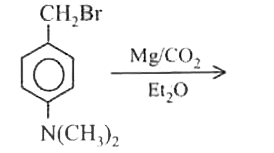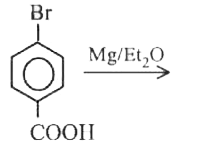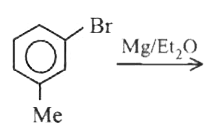Which of the following compound reacts with Grignard reagent to produce alkane?
(CH≡C−CH3)
(CH3CH2NH2)
(CH3COOH)
All of these
To determine which compound reacts with a Grignard reagent to produce an alkane, we need to understand the nature of Grignard reagents and their reactivity with acidic hydrogen-containing compounds.
1. Understanding Grignard Reagents:
Grignard reagents are organomagnesium compounds represented as R-MgX, where R is an alkyl or aryl group and X is a halogen. They are highly reactive and act as nucleophiles.
Hint: Remember that Grignard reagents can react with compounds that have acidic hydrogen.
2. Identifying Acidic Hydrogen:
Acidic hydrogen is typically found in compounds like alcohols, carboxylic acids, amines, and terminal alkynes. These compounds can donate a proton (H⁺) to the Grignard reagent.
Hint: Look for functional groups in the options that contain hydrogen atoms bonded to electronegative atoms (like O or N).
3. Analyzing the Options:
- Option 1: Terminal alkyne (R-C≡C-H) has an acidic hydrogen.
- Option 2: Thiol (R-SH) has an acidic hydrogen.
- Option 3: Carboxylic acid (R-COOH) has an acidic hydrogen.
- Option 4: All of the above compounds contain acidic hydrogens.
Hint: Check each option for the presence of acidic hydrogen.
4. Reactions with Grignard Reagents:
- When a Grignard reagent reacts with any of these compounds, it will abstract the acidic hydrogen, leading to the formation of an alkane (RH) and a magnesium salt (RMgX).
Hint: Remember that the product will always be an alkane when the Grignard reagent reacts with an acidic hydrogen.
5. Conclusion:
Since all the options provided (terminal alkyne, thiol, and carboxylic acid) can react with Grignard reagents to produce alkanes, the correct answer is that all of these compounds can react with Grignard reagents.
Final Answer:
All of the above compounds react with Grignard reagents to produce alkanes.
Grignard reagents are organomagnesium compounds represented as R-MgX, where R is an alkyl or aryl group and X is a halogen. They are highly reactive and act as nucleophiles.
Acidic hydrogen is typically found in compounds like alcohols, carboxylic acids, amines, and terminal alkynes. These compounds can donate a proton (H⁺) to the Grignard reagent.
- Option 1: Terminal alkyne (R-C≡C-H) has an acidic hydrogen.
- Option 2: Thiol (R-SH) has an acidic hydrogen.
- Option 3: Carboxylic acid (R-COOH) has an acidic hydrogen.
- Option 4: All of the above compounds contain acidic hydrogens.
- When a Grignard reagent reacts with any of these compounds, it will abstract the acidic hydrogen, leading to the formation of an alkane (RH) and a magnesium salt (RMgX).
Since all the options provided (terminal alkyne, thiol, and carboxylic acid) can react with Grignard reagents to produce alkanes, the correct answer is that all of these compounds can react with Grignard reagents.
All of the above compounds react with Grignard reagents to produce alkanes.
Topper's Solved these Questions
Similar Questions
Knowledge Check
Which of the following compounds form a stable Grignard reagent ?
ACH3−CH2−O−CH2−BrMg−−→Et2OB C
C D
D
Which of the following compound gives a ketone with Grignard reagent ?
AFormaldehydeBEthyl alcoholCMethyl cyanideDMethyl iodideWhich of the following compound gives a ketone with Grignard reagent?
AFormaldehydeBEthyl alcoholCMethyl cyanideDMethyl iodide
Alcohols react with Grignard reagent to form
View SolutionAlcohols react with Grignard reagent to form
View SolutionWhich of the following reacts with grignard reagent to give alkane:
View SolutionAcetone reacts with Grignard Reagent to form
View SolutionWhich of the following compounds reacts fastest with Lucas reagent?
View Solution
